Just minutes before the coin toss that would kick off Super Bowl 50, “Broadway Joe” Namath, former American football quarterback, American Football League icon and Hall of Famer, shared some interesting thoughts about storytelling. “If you go across America,” Namath suggested in the pre-game video, “what you’ll learn is that stories mean a lot to people…the lessons they teach, the characters they turn into legends. Well I’ve got a story for you. Let me tell you why I think it’s so great. It’s because you couldn’t have written what’s happened in this game over the past 50 years. I just don’t think anyone would believe it.” Namath went on to describe how the Super Bowl got its name and what that first championship game was like. But it was his words about storytelling that were meant to foretell a great experience for content marketers and consumers alike.
If any event had the makings of an emotional experience and primed for great storytelling it was Super Bowl 50. This game would mark the half century anniversary of the event itself. Legends from 50 years of the sport would be recognized in a formal ceremony. On the field two great quarterbacks would be pitted against each another—Peyton Manning, the sentimental favorite looking to capture one last Super Bowl ring before the likely announcement he would retire and Cam Newton, a young, brash QB who helped lead the Carolina Panthers to a place in the big game. Surely all this emotion would also be captured in this year’s offerings of Super Bowl commercials? Certainly this would be the year advertisers and content marketers would take to heart all the research and data and trend information available that clearly indicates content must focus around emotion and empathy for its target audience in order to achieve brand goals? Undoubtedly, Super Bowl 50 would be the year advertisers would marry emotional messages with memorable visuals?
Unfortunately, for the most part, Super Bowl 50 ads were emotion-less, lacking any real messages that would truly resonate with viewers. Oh, like most years, this year’s offerings of Super Bowl commercials had its favorites. There was Mountain Dew Puppy Monkey Baby, the Heinz flying dachshunds and more than one odd pharma-focused ad centered around Opioid constipation ad.
However, it’s worth remembering that in addition to entertaining and educating, really great content marketing grabs audiences by evoking emotion and demonstrating empathy. Upon consuming the content, the end user should feel like the brand “really gets me”. Super Bowl commercials are no different. The best of them, the ones that are memorable with long-term staying power, are those that are emotional, evocative, empathetic and representative of a common human experience. Content that accomplishes these goals make us feel deeply, make us think and make us feel understood.
In this regard, however, not every brand fumbled in the championship of all advertising games. Some commercials truly scored when it came to developing emotional, empathetic messages aimed at their target audiences. Here are a few of the winners.
Bedtime routine goes awry.
What dad (or mom) can’t identify with strapping their young one in the back of the car late at night in the hopes the drive will do the trick that finally puts them to sleep? That’s the premise of Subaru’s engaging commercial featuring adorable dogs engaged in this time-honored parenting practice.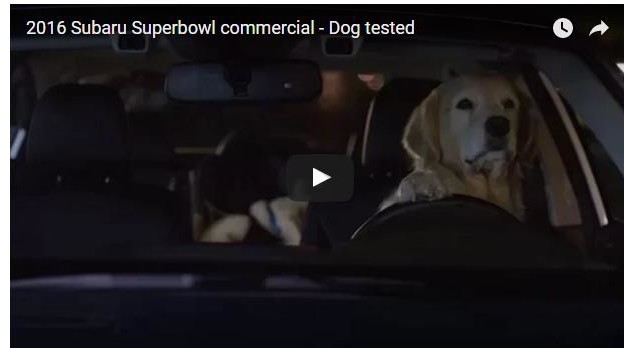
The quiet solitude of the night as “dad” drives his pup around town, the hopeful look on dad’s face as he checks to see if his pup is finally asleep, and the note of resignation as dad pulls into the driveway only to realize his pup is wide awake and will need another spin or two around the neighborhood to fall asleep. The commercial not only captures the emotion of the moment but also an experience with which parents everywhere can clearly identify.
Don’t be a pillock. Don’t drive drunk.
If you want to convince people to stop driving drunk, there’s no better messenger than “notoriously frank and uncensored British” actress Helen Mirren. In its PSA for its #GiveADamn campaign, aimed at reducing drunk driving, Budweiser taps into Mirren’s no-nonsense approach to point out that anyone who engages in drinking and driving is nothing short of an idiot and worse. 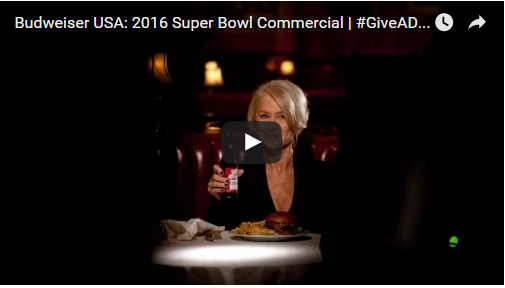 Leaving nothing to interpretation, Mirren states explicitly that if you drive drunk “you, simply put, are a short-sighted, utterly useless, oxygen-wasting human form of pollution, a Darwin award deserving selfish mountain of fresh manure. If your brain was donated to science, science would return it. So stop it.” Elevating the “telling it like it is” approach, Budweiser, via messenger Mirren clearly admonishes: “Don’t be a pillock. Your friends and family thank you. The friends and family of other drivers thank you. Your future self thanks you.” You’d be hard pressed to find someone whose life wasn’t in some way touched by drunk driving. Indeed, after watching this commercial, any drunk driver, victim of drunk driving or family or friend who lost a loved one to drunk driving surely gets the point. Drunk driving is idiotic so just stop it. Well done Budweiser.
Leaving nothing to interpretation, Mirren states explicitly that if you drive drunk “you, simply put, are a short-sighted, utterly useless, oxygen-wasting human form of pollution, a Darwin award deserving selfish mountain of fresh manure. If your brain was donated to science, science would return it. So stop it.” Elevating the “telling it like it is” approach, Budweiser, via messenger Mirren clearly admonishes: “Don’t be a pillock. Your friends and family thank you. The friends and family of other drivers thank you. Your future self thanks you.” You’d be hard pressed to find someone whose life wasn’t in some way touched by drunk driving. Indeed, after watching this commercial, any drunk driver, victim of drunk driving or family or friend who lost a loved one to drunk driving surely gets the point. Drunk driving is idiotic so just stop it. Well done Budweiser.
Choosing the moon brings out the best in us.
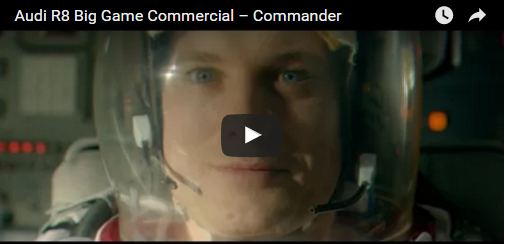
For pure emotion, you’d be hard pressed to beat Audi’s commercial this year that pays a sentimental tribute to the Apollo 11 trip to the Moon led by Commander Neil Armstrong with a nod to the late David Bowie whose famous “Starman” hit is used as a reminder of the real power behind exploration and technology. Filled with images from the Space Age’s golden years, the video’s caption notes that “a retired astronaut has lost his zeal for life.” It’s only when his son hands over the keys to the new 205-mph Audi R8 V10 plus promising a rocket ride under the stars that the “Commander” comes back to life. Through impactful use of imagery and messaging, the auto brand evoked strong feelings of nostalgia, pride and achievement, connecting generations from the past, present and future. The the ad aptly stated, “Choosing the moon brings out the best in us.”
Whew! Let go and breathe.
Who has not, at one time or another, felt like they were drowning? Drowning in work, drowning in stress, drowning in financial obligations. SunTrust wants you to know they understand how you feel. With varying images of people taking deep breaths in times of stress, the SunTrust campaign exemplifies the concept of possessing empathy for its customers. It leaves us believing that the brand truly understands how we’re feeling and has a solution to make us feel better.  As the commercial underscores, “ Hold your breath. What you’re feeling now is just like financial stress. It’s like you’re drowning. Meanwhile the moments that matter slip away. SunTrust is about helping America catch its breath by lighting the way to financial confidence. So now let go and breathe. Feel that relief.” What is more empathetic than that?
As the commercial underscores, “ Hold your breath. What you’re feeling now is just like financial stress. It’s like you’re drowning. Meanwhile the moments that matter slip away. SunTrust is about helping America catch its breath by lighting the way to financial confidence. So now let go and breathe. Feel that relief.” What is more empathetic than that?
What other Super Bowl 50 commercials resonated with you? Share your thoughts here on how you create content messaging that evokes emotion and empathy in your target audiences.
Are you one of the Beige Sock people?
That’s the question actor Christopher Walken poses in Kia’s commercial that combines celebrity, clever messaging, a “Walken” closet and yes, even sock puppets to reel in viewers. 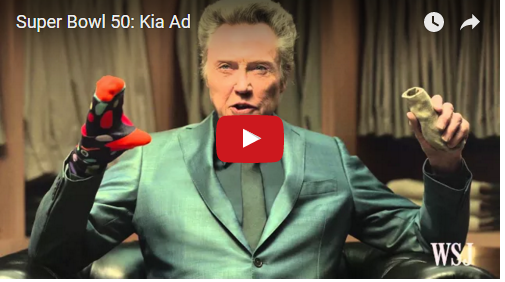 At its core, the commercial asks viewers to ponder the age-old question: Who do you really want to be? Are you satisfied being the status quo, boring and beige? Or, do you want to be someone who’s unique, special and exciting? After all, who among us wants to be beige? As Walken notes in a voice only he can: “There are two types of people in this world–those who are content to blend in, these people walk through life like beige socks. Then there are those who expect more. They’re exciting. They have pizzazz. Eventually the beige sock people get devoured by the ones who stand out. Do you want to be devoured?” And of course no one wants to get devoured. All the better to pursue the world’s most exciting pair of socks in the form a Kia’s new mid-size sedan. Punch this one a winner.
At its core, the commercial asks viewers to ponder the age-old question: Who do you really want to be? Are you satisfied being the status quo, boring and beige? Or, do you want to be someone who’s unique, special and exciting? After all, who among us wants to be beige? As Walken notes in a voice only he can: “There are two types of people in this world–those who are content to blend in, these people walk through life like beige socks. Then there are those who expect more. They’re exciting. They have pizzazz. Eventually the beige sock people get devoured by the ones who stand out. Do you want to be devoured?” And of course no one wants to get devoured. All the better to pursue the world’s most exciting pair of socks in the form a Kia’s new mid-size sedan. Punch this one a winner.
A dad’s gotta do what a dad’s gotta do.
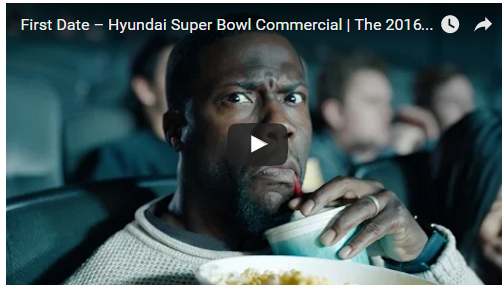 Without question, every overprotective dad of a teenage daughter saw himself in actor Kevin Hart who played a dad using the Honda Genesis Car Finder watch app to keep track of his daughter’s whereabouts on her date night. Of course, humor and mayhem ensue when Hart follows his daughter on her date from movie theatre to carnival to lookout point. Hanging from a helicopter, Hart screams, “You’re messing with the wrong daddy!”, causing his daughter’s date to quickly call it a night and hightail it out of there delivering daddy’s little girl safely back home. Funny and clever, the overprotective parent or teenager in you gets that “A dad’s gotta do what a dad’s gotta do.”
Without question, every overprotective dad of a teenage daughter saw himself in actor Kevin Hart who played a dad using the Honda Genesis Car Finder watch app to keep track of his daughter’s whereabouts on her date night. Of course, humor and mayhem ensue when Hart follows his daughter on her date from movie theatre to carnival to lookout point. Hanging from a helicopter, Hart screams, “You’re messing with the wrong daddy!”, causing his daughter’s date to quickly call it a night and hightail it out of there delivering daddy’s little girl safely back home. Funny and clever, the overprotective parent or teenager in you gets that “A dad’s gotta do what a dad’s gotta do.”
Define YOURSELF. Defy labels.
Labels have no place in this world. That’s the strong message Mini Cooper aimed to convey in its streamlined, no-nonsense commercial for its Clubman brand that features tennis player Serena Williams, soccer player Abby Wambach, rapper T-Pain, baseball player Randy Johnson, skateboard legend Tony Hawk, and actor Harvey Keitel. Acknowledging that everyone and everything is labeled in this world, the campaign effectively communicates that it’s how you deal with those labels that count. 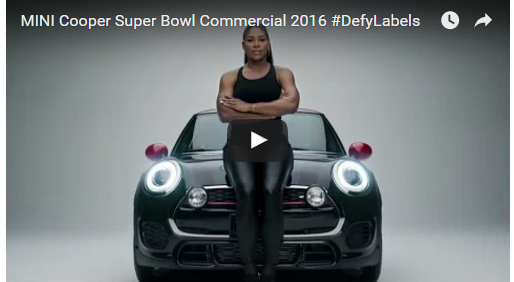 It serves to inspire people to ignore meaningless labels that are forced upon them and instead define themselves. The message is inspiring and well executed, evoking both real emotion and empathy for all those who have faced the consequences of being labeled. As the auto brand clearly states, “This car doesn’t care what you call it. Defy labels.”
It serves to inspire people to ignore meaningless labels that are forced upon them and instead define themselves. The message is inspiring and well executed, evoking both real emotion and empathy for all those who have faced the consequences of being labeled. As the auto brand clearly states, “This car doesn’t care what you call it. Defy labels.”
What other Super Bowl 50 commercials resonated with you? Share your thoughts here about ways in which you create content messaging that is emotional and empathetic.
Share This
Recent Blog Posts
- International Women’s Day: Taking action to gain traction
- Be a shoulder and a hand: 10 ways to help women in the workplace show up and shine up
- Unfinished Business: Content Marketing’s Role in Cracking the Glass Ceiling
- Lessons Learned from 84 Lumber’s Super Bowl Fail
- Brands Rise Up to Stand Out in Super Bowl 2017
Categories
Blog Post Tags
My Tweets

About Me
Portfolio Categories
Follow Me
Recent Posts
-
International Women’s Day: Taking action to gain traction
The first time I noticed men and women were treated...
-
Be a shoulder and a hand: 10 ways to help women in the workplace show up and shine up
International Women’s Day is an important day of...
-
Unfinished Business: Content Marketing’s Role in Cracking the Glass Ceiling
When it comes to tackling the gender equality issue...
-
Lessons Learned from 84 Lumber’s Super Bowl Fail
84 Lumber got it wrong on Super Bowl Sunday. In fact,...



















